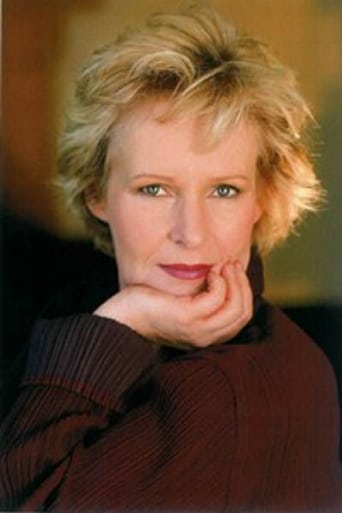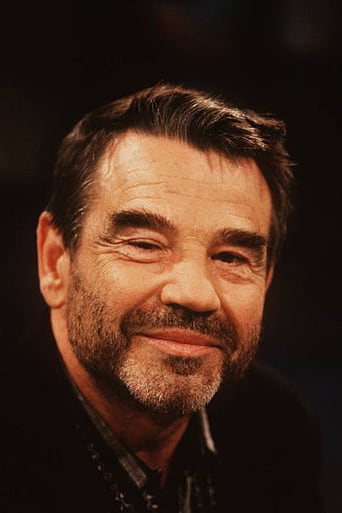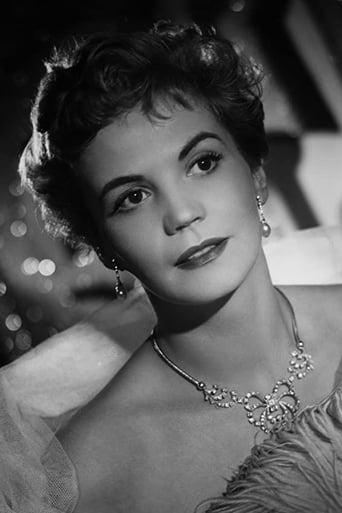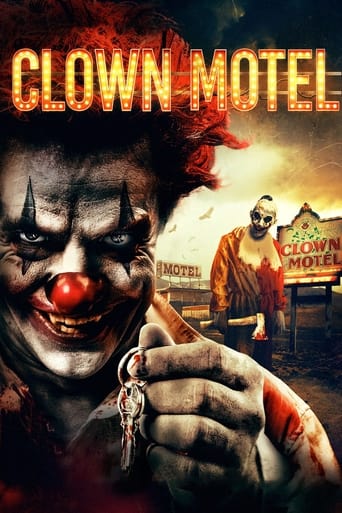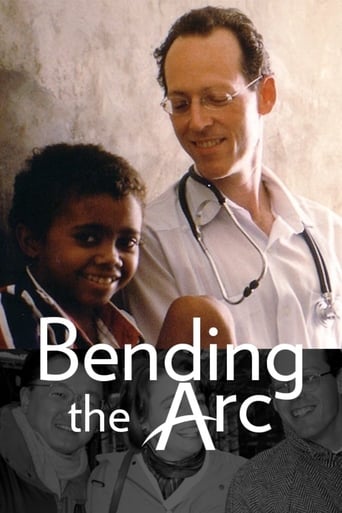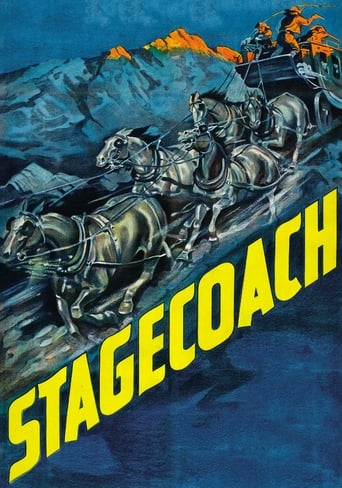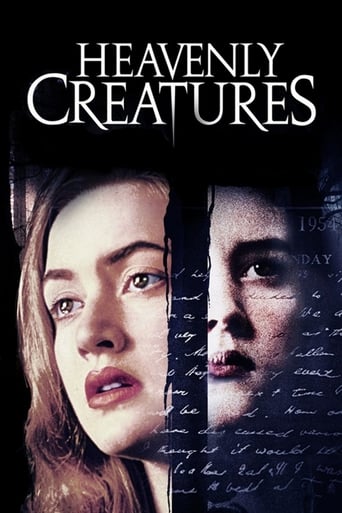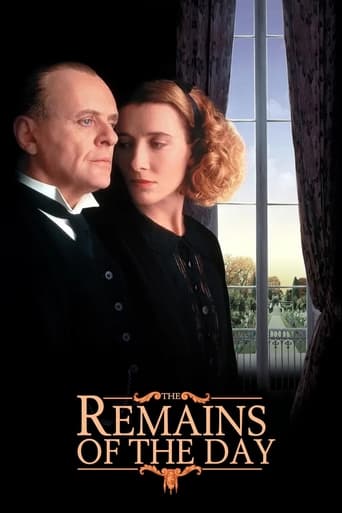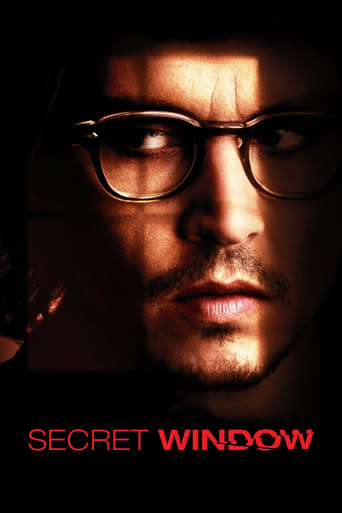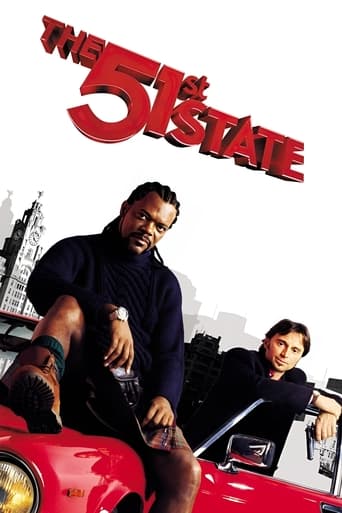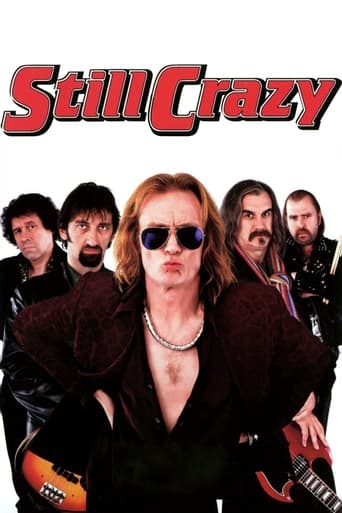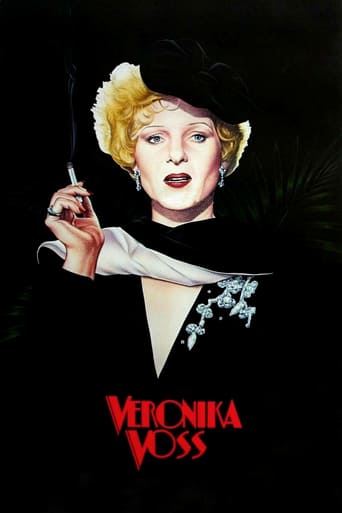
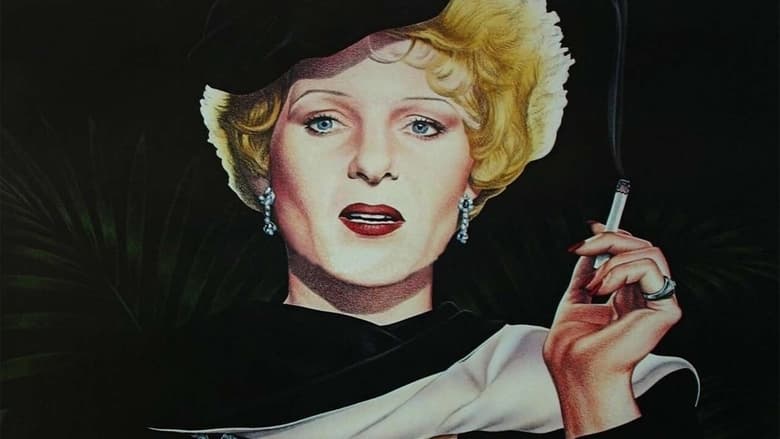
Veronika Voss (1982)
In Munich 1955, German film star Veronika Voss becomes a drug addict at the mercy of corrupt Dr. Marianne Katz, who keeps her supplied with morphine. After meeting sports writer Robert Krohn, Veronika begins to dream of a return to stardom. As the couple's relationship escalates in intensity, Veronika begins seriously planning her return to the screen -- only to realize how debilitated she has become through her drug habit.
Watch Trailer
Cast


Similar titles
Reviews
Good movie but grossly overrated
One of the most extraordinary films you will see this year. Take that as you want.
This is a coming of age storyline that you've seen in one form or another for decades. It takes a truly unique voice to make yet another one worth watching.
This is a dark and sometimes deeply uncomfortable drama
In her own eyes,Veronika Voss is not really alive unless she retains her audience, unless she is loved and admired for her manufactured image. There are times in movies when Technicolor will not do, when the use of traditional black and white evokes evokes film noir, in this case referencing Billy Wilder's brilliant evisceration of and the pain of fading fame, Sunset Boulevard. The fine shadings of mood and atmosphere reflect the life led by Veronika under studio lights, just as the stark, unrelenting whites at her doctor's office blind her to reality during her visits for morphine injections.Veronika Voss is based on the life of an actual German actress who rarely came alive unless under the lights, depicting a harsh and unrelenting life lived vicariously; it is a harsh look at a cruel existence increasingly dependent on addictive drugs to soften the hard knocks that come with the loss of fame and inability to face simultaneous aging process; it is a film worth repeated viewings.
This sumptuous black and white period piece, tells the story of a once famous film star, Veronika Voss (Rosel Zech). After a chance encounter on a bus with Robert Krohn (Hilmar Thate), there lives are entwined, with Krohn finding himself trapped in a cat-and-mouse search for Voss's sanity, her past lives, and the many sycophants and gold diggers in 1950's Germany. Voss, now struggling to find work after a highly successful period, particularly in the 1940's, is addicted to drugs and alcohol and has paranoid delusions when out on the street; Krohn is pulled into this as he did not recognise who she was, and she vaguely sees him as protection.One of the last of Fassbinder's films - he died of an overdose (the official conclusion was suicide) in 1982 - which was also the last of a trilogy focusing on Germany's economic boom in the 1950's (the others being The Marriage of Maria Braun (1979) and Lola (1981)), the film also reflects some of the themes that the New German Cinema at the time. It was a time that Germany was reflective of World War 2, and the trauma that prevailed in a country torn between guilt and a resurgence of decadence and wealth as in the 1920's Weimar Republic. It is stated in the film that Voss's best period was during this period, and that she had been the star of Nazi Germany. After the fall of Nazi domination, she was cast aside.Like Billy Wilder's Sunset Boulevard (1950), Veronika Voss highlights an industry that can easily create monsters, and also devastate lives. But unlike Wilder's subtle version of lost fame, Fassbinder shows the devastating effects of drug addiction, and the underbelly of society that is encountered in this process. Historically though, this is deeper and a hell of a lot more emotionally charged and interesting than Sunset. After all, this is not a Hollywood story, but is a post-World War 2 story of judgement, and loss after such a integrally debasing event in human history. How do you continue after working under the despotic power of the Nazi party? The elements of Nazi Germany are still in process, in the form of Veronika's control.The film is said to be based upon the real-life German film actress, Sybille Schmitz, who died of an overdose in 1955 at the tender age of 45. The film shows shows that the shadow of the war had a lasting effect on the German nation, that would take decades to come to terms with. This is film making par excellence. Haunting, beautiful, with a climax that is inevitable, shocking, but very satisfactory. Rosel Zech's performance is pitch perfect, her face in a constant state of anguish.www.the-wrath-of-blog.blogspot.com
I liked "Veronika Voss" surprisingly much. I saw some themes in there that kept my interest. So far I hadn't liked RWF's films of his last period (that's out of three periods). I especially liked how it took the word "Sehnsucht" literally: sehnen = yearning; Sucht = addiction. It's how I like to ponder on the word.What I think appealed to Robert about Veronika was her public status. She was a prestigious grande dame, not unattractive and he thought she was rich. Such a person has a special appeal. Robert's girlfriend also understood this appeal very well and almost accepted the situation without putting up a fight. Robert's appeal for Veronika was that she told herself that he was interested in her for her own (fading) beauty, while in reality he did recognize the film star before he offered her "umbrella and protection".A moment that made me break out in laughter was also towards the beginning when Veronika and Robert are having a drink, he says something like "reality isn't like a movie", she agrees and not even a second later she turns to the waiter and bursts out: "The lighting is hideous in here! Turn those lights off and light the candles!" Also unsubtle but very poignant and a humorous moment.For a minute I was a bit disappointed when in the film suddenly a villain emerged in the person of the doctor. It wasn't what I wanted from the film, but it unexpectedly actually made this RWF's most suspenseful film because of the second half. I find it to be more of a thriller than 'Martha' was.The scene with Veronika denying Robert Krohn in front of the police I thought would have made a satisfying and poignant ending but it continued the story quite hastily with Veronika dying and Robert giving up, which eventually also made for a good and probably even more poignant ending.I'm sure those anything-but-subtle lens flares had their purpose. For Veronika it wasn't just a happy past but she glorifies this time of her life, which justifies this extreme visual effect.The overall bright B&W photography is excellent eye candy. It's an unusual approach to tell a dark story in so much white and to tell a relatively sober period piece in stark B&W.
Veronika Voss is a movie in love with movies, and also a movie where its maker, RW Fassbinder, continues on his life/career-long obsession with capturing the essence of melodrama on screen. He might have come closest with this story, since it allows him to make it a "movie-movie", so to speak. I saw some echoes, mayhap, of Sunset Blvd and even Ed Wood, and that may just be attributable to it being a true story (more or less as one would gather from this cinema "tribute" to Sybille Schmitz), but maybe too in how fascinated Fassbinder is with glamor and decadence, decay and self-absorption, the mental faculties to be caring and gentle (Robert) and with a streak that suggests the very essence of everything arguably wrong in Germans (the doctors who keep Veronika quasi-captive, hooking her onto morphine). It's a glorious, multi-faceted critique of a time and place, of a 1950s Germany that had moved on from the war only relatively - the madness could, and would, continue on in ways that involve some subtext, and some things so out in the open it's hard to stand it.It's ostensibly, in its "plot" sense, about a sports reporter for a paper, mild-mannered Robert, who on a bus one night helps shield the movie star (or once real "STAR" in quotes) Veronika Voss (very great Rosel Zech). She's interested in him, convinces him to buy her an item for $300, and he's interested too - if only for how she's not really, how to say, 'balanced', and we soon see that she is in fact under medical care of an unusual sort by Dr. Marianne Katz. That, and the involvement soon after with Robert's girlfriend in trying to figure out how to get Veronika real help, of getting the police involved as well, makes up the bulk of the rest of the story. We also get a subplot of sorts with an old couple (one look at the arm, numbers tattooed, is all that's needed to fill the pieces), but Fassbinder isn't interested in plot, per-say. He's interested in how to move it, how to transgress a simple melodrama into something more lively, profound and moving.He's also invested in creating this look for the film that is at times expressionistic of a 1930s tone, of the dark corners and streets and moments of a film-noir, and then sudden blasts of bright light thrown in (an early scene has a bunch of lights intentionally blasting at the camera lens, a perfect homage to cinema itself), with the glamor of a expensive restaurant contrasted with the white walls of Katz's quarters. Fassbinder wants us to see this as a "movie" in the sense of the usage of crafty dissolves and fades, or those wipes that are precisely artificial, but at the same time not lose sight of the drama at hand. Part of this is the acting, which is by many of Fassbinder's regulars- not least of which Armin Mueller-Stahl in a terrific, quiet but haunted supporting role as a screenwriter and ex-husband of Veroika's who says a great deal in one look to Robert down a hallway while a scene is being shot; or Günther Kaufmann, perhaps the one loose link to the previous film in the "BDR trilogy" as a G.I. who adds a curiously affecting song he sings to himself in the middle of a dramatic scene between the doctor and Veronika.Another part of this are just many, many great scenes and moments put together. Things like when the doctors start to laugh after one of them says around Veronika "It's not like we're trying to kill you," with it bordering on an Austin Powers level of absurdity, if it weren't for it being so cold a moment of satire. Or how we see Robert and Veronika contrasted, brilliantly by cinematographer Schwarzenberger, with Robert being relatively normally lit while Veronika's face gets slightly brighter with each cut-away as they talk at a table in the restaurant. Or how music is used throughout, the collection of tunes from the radio mixing with the actual score, creating a sense of illusion and madness that gets us close to the psyche of Veronika Voss while still maintaining the homage-quality of the picture. And, most notably for me, are the closing scenes, where, without revealing too much (though it may be hard in just revealing it's a melodrama at the core), Veronika dreams of a farewell party, that may be surreal enough to be a dream, but in that first moment of singing at the piano who is to say?It's such a stroke of beautiful film-making all around, from the mix of sets and real locations to the sense of history captured, of the given theme of fame being so easy to disintegrate, of the melancholic sense of cinema that bears on our lives while civilization crumbles and gets back up again. Maybe this is just what I took away from it, but it's all a credit to Fassbinder's dedication to his art form - which, soon after this, took his own life from a similar excess to that of his character here. Moreover, it's one of the superb films of its country.


